William Edwards slid into the world
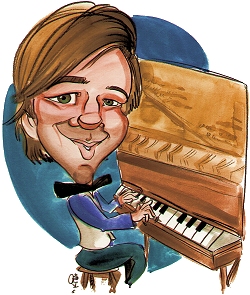
in Southern California at a time when there were 49 states in the USA (he owns a flag with a 7x7 star field), Richard Nixon was starting preparations for his designs on a White House bid,
Bill at the piano at 2 years, 2 months.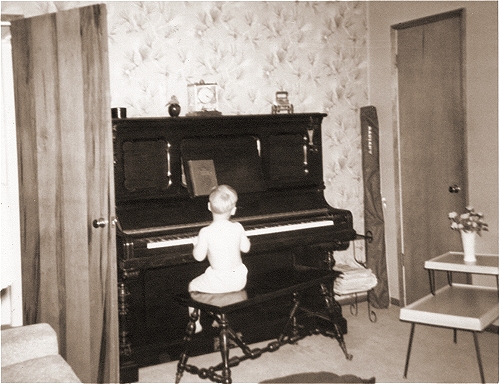 |
Television was still mostly broadcast in black and white, Disneyland had just added some of their best attractions to date, and the first ragtime revival and honky-tonk craze was nearing an end.He was obviously exposed to the piano at a very early age, as indicated in the shot shown to the left, a moment that, at 2, he still fails to remember. At the age of nearly 6, Bill's parents divorced, and his dad left behind some 10 inch discs of the
Firehouse Five Plus Two,
Frankie Carle,
Joe Fingers" Carr (aka
Lou Busch), and
Paul Lingle, all full of Ragtime, Honky-Tonk, and Dixieland-style music. He immediately immersed himself into these few worn pieces of vinyl and began a journey into the metaphorical rabbit hole of syncopated desires. Crawling inside of the sounds of these wonderful records, the trauma around him went away, because ragtime was pure happiness. At a time when
The Beatles,
Beach Boys and
Herb Alpert were making it big, Bill absorbed the influences of both Rock and Roll and Traditional Jazz, plus its direct ancestor ragtime.
At about the same time, young Bill had learned how to make intelligible melodies on the melodeon, a sort of annoyingly shrill mouth-blown keyboard. He was eager to demonstrate each new melody to his mother, who was not always so receptive to such events in her bedroom. At 6 a.m. On a weekend. The ultimate solution for channeling this talent was for her to ask Grandpa to get a piano. Being that the Kawai that was purchased outweighed young William by some 250 pounds, it could not be dragged down the long San Fernando Valley ranch house hall into her bedroom in the early morning hours for dawn concerts. It did, however, allow him a way to channel his burgeoning talents and an escape from some of the more harsh aspects of the reality around him at that time. Eventually, it was the reality of ragtime piano that would become a part of his passion.
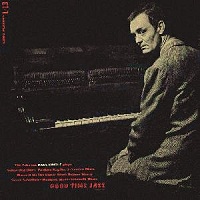 Original album cover for Paul Lingle on Good Time Jazz. |
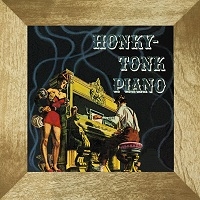 Original 10 inch album cover for Honky-Tonk Piano on Capitol. |
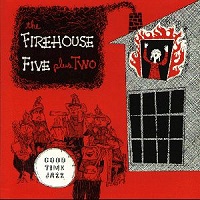 The Firehouse Five Plus Two's second album on Good Time Jazz. |
The budding musician quickly took hold of the instrument (but still could not lug it down the hall), and was soon demonstrating his skills at
The Old Mill,
Merrily Merrily,
Little Sonata in G, and
Yes Sir That's My Baby. By the age of eleven, Bill was equally versed in
Beethoven,
Bacharach,
Beatles, and
Bawdy Ragtime songs.
The Sting soundtrack album.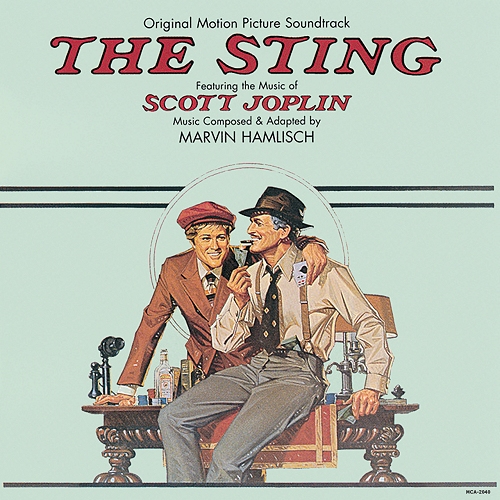 |
This made him sort of a geeky star in elementary school, especially when rendering the big old-fashioned hit of that time,
Raindrops are Falling On My Head (Bacharach and David). By fourteen, he had learned around half of the
Scott Joplin catalog and most of
Elton John's and
Billy Joel's, and had been the choir accompanist for at least three years. This made him sort of a geeky star in Junior High School as well. So when that
Sting film thing came out, he already could play most of the score, impressing the masses who cared enough for that kind of thing. Bill spent the majority of his secondary school years in front of a piano, and also learned piano tuning and repair to boot. He also played and sang with choirs and bands throughout his time at Grant High School, including musicals such as
Brigadoon,
West Side Story, and
Fiddler on the Roof. This made him - well - sort of a geeky star type of person - maybe - in high school as well.
A half-hearted attempt was made at CSUN (California State University Northridge) to go after a business degree, but it was met by Bill with indifference after three semesters.
Bill at the Diamond Belle circa 1983.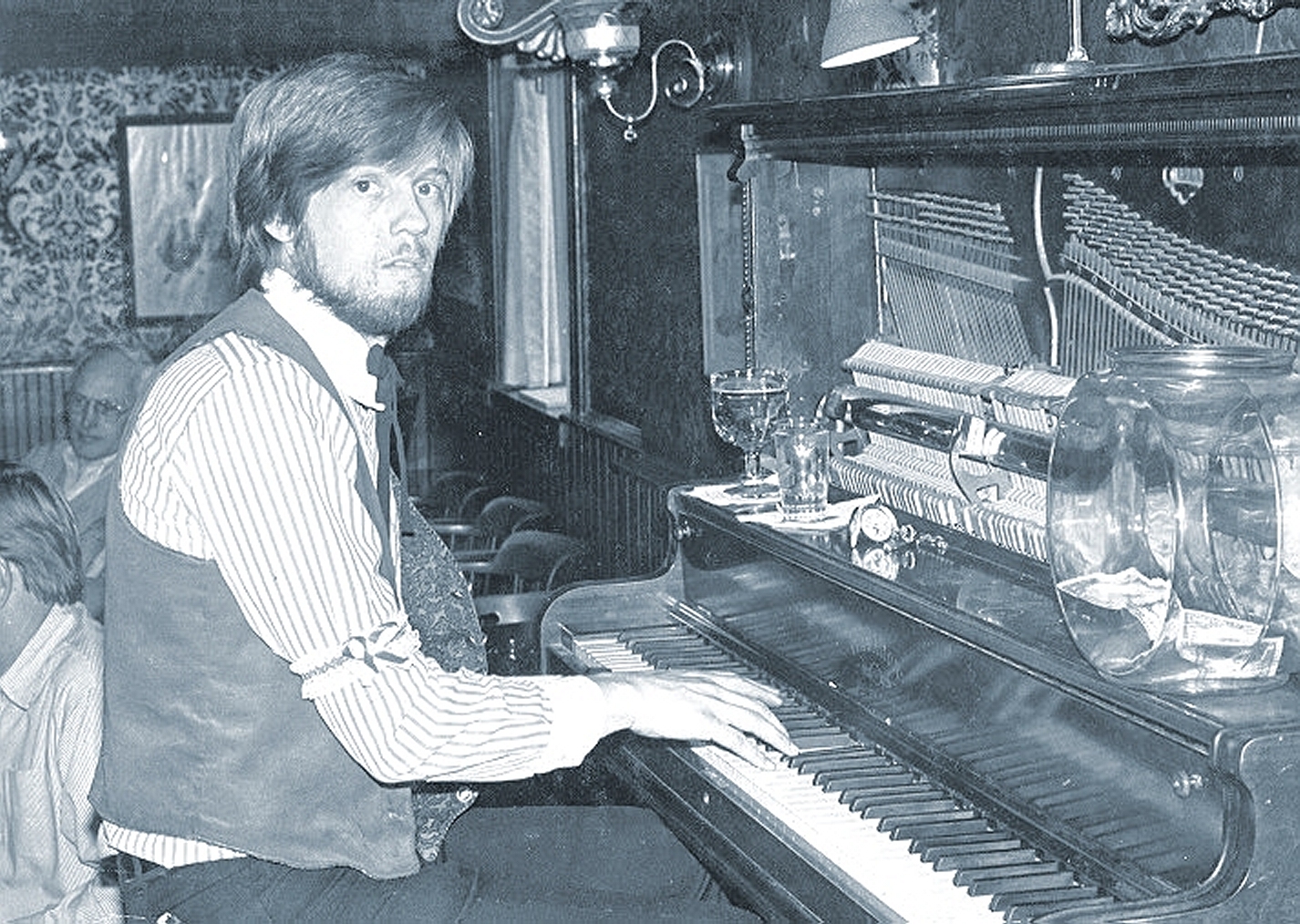 |
His heart was elsewhere. Bill worked as an intern for a couple of record companies and attended Los Angeles Valley Community College. After receiving a broadcasting degree (AA) from LAVCC, Mr. Edwards moved from the increasingly congested, earthquake-ridden fire-infested smog-choked and otherwise lovely San Fernando Valley to
Durango, Colorado, where his parents had moved prior, in hopes of establishing himself as the town's piano technician. While repairing a player piano at a local pizza parlor (then called
Cable Car Pizza), the owner heard Bill play and hired him as a draw for the weekends. After a couple of months, The
Abbey Theatre, a melodrama-style theater next door, hired him for a season of productions. In the midst of this, the well-established
Dick Kroeckel, who played ragtime piano at the
Diamond Belle Saloon in the
Strater Hotel, asked Bill to fill in for him during a brief vacation.
Bill with Jo-Ann Castle in Sedalia, Missouri in 1989.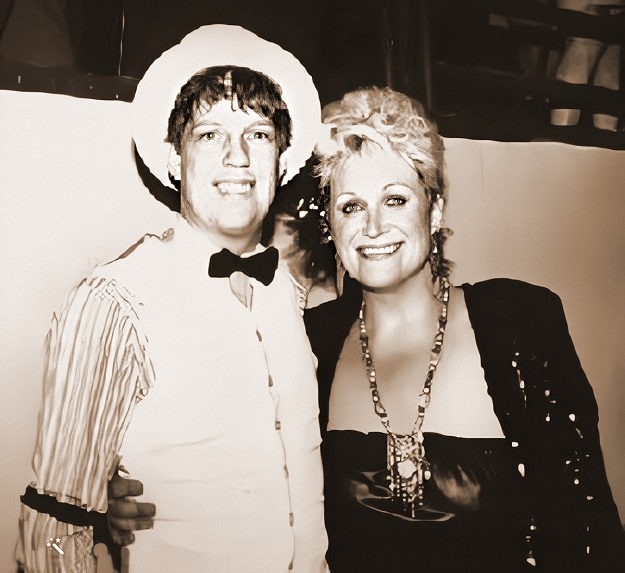 |
Within a very short time, the "Perfessor" had his own niche at the Diamond Belle, and played there for six years, sharing duties with Mr. Kroeckel,
Molly Kaufman,
Jim Rowe, and a few other talented pianists who helped shape his style and repertoire. Bill still considers the late Mr. Kroeckel as his mentor, for the invaluable advice and time given to him over those years. As an added benefit, Dick, in turn, had learned much of his craft directly from the inimitable ragtime recording pioneer, the late
Johnny Maddox.
The name "Perfessor" was adopted on his behalf in reference to early ragtime piano players. Their official title was often "Professor", but pronunciations routinely aberrated the word into "Perfessor." A local fan started referring to Bill as a "Professor" of ragtime one evening, and with the slight alteration in spelling and pronunciation, the name stuck instantly. People do remember it, even if they don't (or he still does not) know why, so he decided to go with it, taking the good publicity with the sometime suspect connotations in relation to the research on ragtime and its composers he has engaged with over the ensuing decades.
Back to the story, such as it is. While he had several varying careers in a number of fields, including radio broadcasting, a stint as an entertainment reporter for the
Durango Herald,
One of Bill's medals from the World Championship of Old-Time Piano Playing.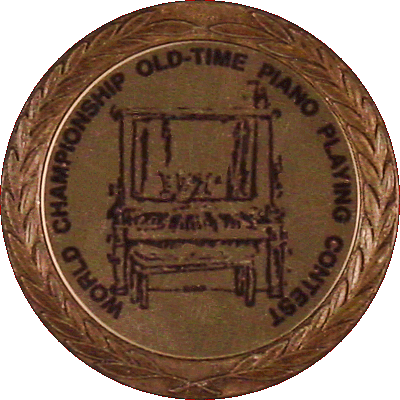 |
and accompanist for many of the public school concerts and adult choral groups, Bill had earned a music degree in Durango from Fort Lewis College. He then had an opportunity to play on the East Coast and left for the Washington D.C. area in late 1986. The original opportunity in Baltimore did not pan out quite as promised, but Bill ended up spending over eight years playing for the Fish Market restaurant and entertainment venue, and has since played everything from Jazz to Classical to Rock in other venues around the Nation's Capital. This included a Christmas performance at the Kennedy Center in Washington, D.C.Mr. Edwards has also performed with many prestigious traditional jazz bands, and worked with or opened for a variety of well-known artists, including
Dave Brubeck,
Al Hirt,
Marie Osmond,
Mel Tillis,
The King Family,
The Kansas City Dixieland Rckets, and
Jo-Ann Castle.
While working by day as a software engineer and web designer since the dawn of the internet, currently contracted to the Veterans Administration in Washington, DC,
The "Perfessor" with the (now retired)
Ted Lemen Traveling Trophy.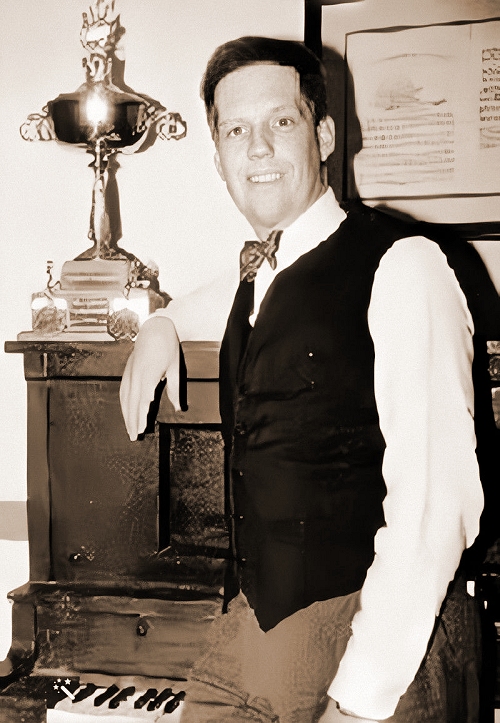 |
at night Bill donned his tie and vest to entertain the residents of and visitors to Northern Virginia in various venues. In the mid-1980's, the "Perfessor" started making appearances at the
World Championship of Old-Time Piano Playing previously held in Monticello, then Decatur, Illinois, then, since the dawn of the 21st century took place over each Memorial Day Weekend in Peoria, Illinois. It has been held at Ole Miss University in Oxford, Mississippi, since 2016, and performance has shifted from the old white upright unaffectionately known as "Moby Dink" to a beautiful Steinway concert grand piano. He has consistently placed in the top five, and even won the title somehow in 1991, having to date amassed more medals from the top five places than any other contestant. His continued enthusiasm for this great forum for performers of all ages and abilities has kept him involved in many facets of the contest, including providing some of the definitions used in the rules as well as leading seminars one year, and ultimately becoming a member of the board of directors. Soon after that came continued performance and seminar appearances at the Scott Joplin International Ragtime Festival in Sedalia, Missouri, usually held within a week of the WCOTPP contest. For many years now, Mr. Edwards has been the seminar director for the festival, also working with the music director to ensure the best quality presentation for those who attend.
Bill with the late "Ragtime Bob" Darch
in Peoria, Illinois, in 2001.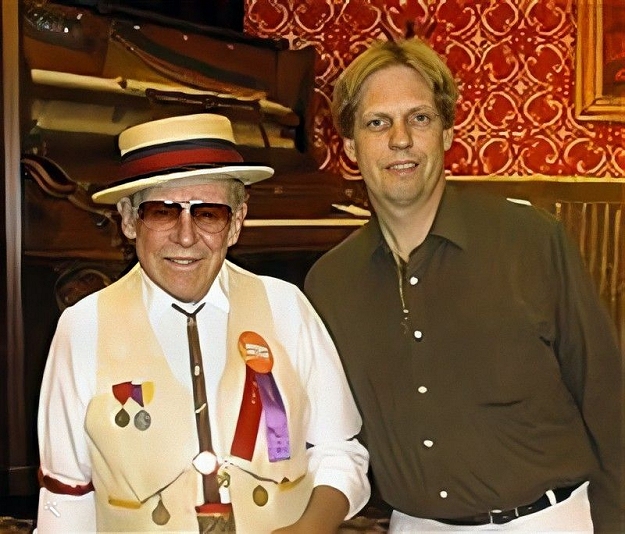 |
Bill has also made appearances at a variety of other traditional jazz and ragtime events around the country, participating as a guest, a contestant, lecturer, judge and/or performer. He was also involved in some live overseas broadcasts to Europe and South America for U.S. Government-sponsored shows on American Musical History in league with Joplin scholar
Dr. Edward Berlin. Much of his accumulated research and knowledge have been invested into this website, which many libraries and universities, along with his peers, have flatteringly cited as a valuable resource for musical and cultural education at all grade levels. For that he is truly grateful and hopes to continue in these efforts for many years.
Since 1984, Mr. Edwards has amassed an impressive
repertoire of over 40 CD recordings,
most of which are still currently available. They cover everything from traditional classic ragtime to early popular song, and even two blues collections. There are always more recordings in the works, and a number of them have been driven and formulated by listener requests, including those generated by his
Ragtime MIDI and Sheet Music Covers page. He has further amassed a collection of original ragtime compositions, including an award winning rag in 2001 titled
The NecromancerEncyclopedia of Female Composers of the Ragtime Era.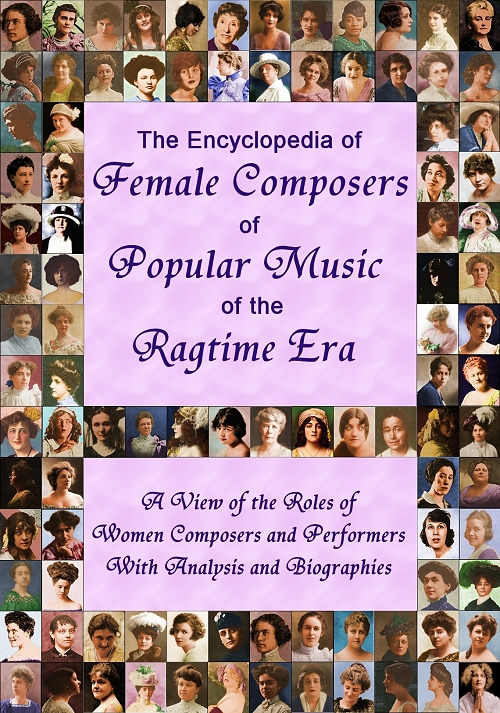 |
(used with other pieces of Bill's in the 2004 feature
Ghosts of Edendale), his 2002 award winner
The Wiener Schnitzel Rag, and his first original syncopated piece from 1985,
The Hanon Rag, which premiered while he was still at Fort Lewis College. His 2014 composition
Lovely Laughing Lucille took first prize for that year's initial
Blind Boone Ragtime Festival Composition Contest. He has won four other composition awards as well for his ragtime works.
Bill broke his left elbow in an accident early in 2002, and subsequently had surgery to excise the shattered radial head in his forearm. When first waking up from that surgery he heard the doctor telling his wife Pamela that "he may never play piano again," at least not with any appreciable agility. However, with dogged determination, aggressive physical therapy and concentrated practice Bill soon recovered to a level of playing that may eventually eclipse his previous abilities, and has been playing well once again for more than a decade following this personal trauma. In fact, even with this injury as an impediment, he took fourth place in the 2002 Old-Time Piano competition in Peoria just four months after the surgery, and has placed in the top five continuously for over three and a half decades. He was one of six individuals profiled in the 2012 award-winning documentary
The Entertainers, which was shot at the 2008-2010 competitions in Peoria,
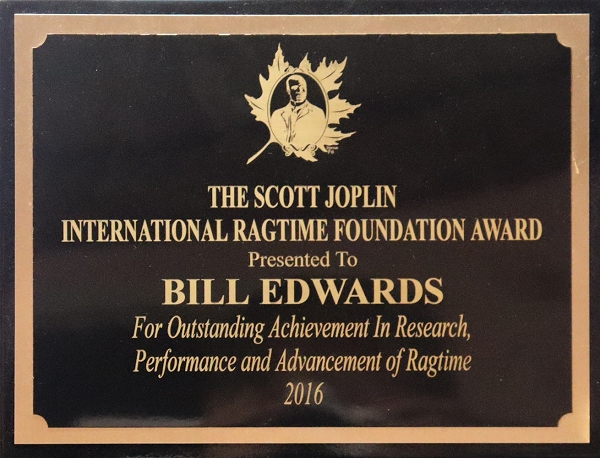
and has represented that documentary in appearances around the United States. In 2014 Bill had the privilege of filling the role of Artist in Residence for the Scott Joplin Ragtime Festival, taking his message to the children of Sedalia and Pettis County, Missouri, and working to instill them with a sense of their important musical heritage. The future clearly holds more ragtime for the "Perfessor" and fans of this truly America music!
The main concentration of effort by Mr. Edwards since the early 2000s has been on researching and writing on composers of ragtime and other music from the late 1890s into the 1920s. He first completed a 400 page book on composer/publisher
E.T. Paull in 2011, followed up by a nearly 1000-page encyclopedia of over 530 female composers of the time period initially completed in 2014,and revised in 2023 [still pending publication].
Bill, decades later, back where he started,
the ol' Diamond Belle Saloon.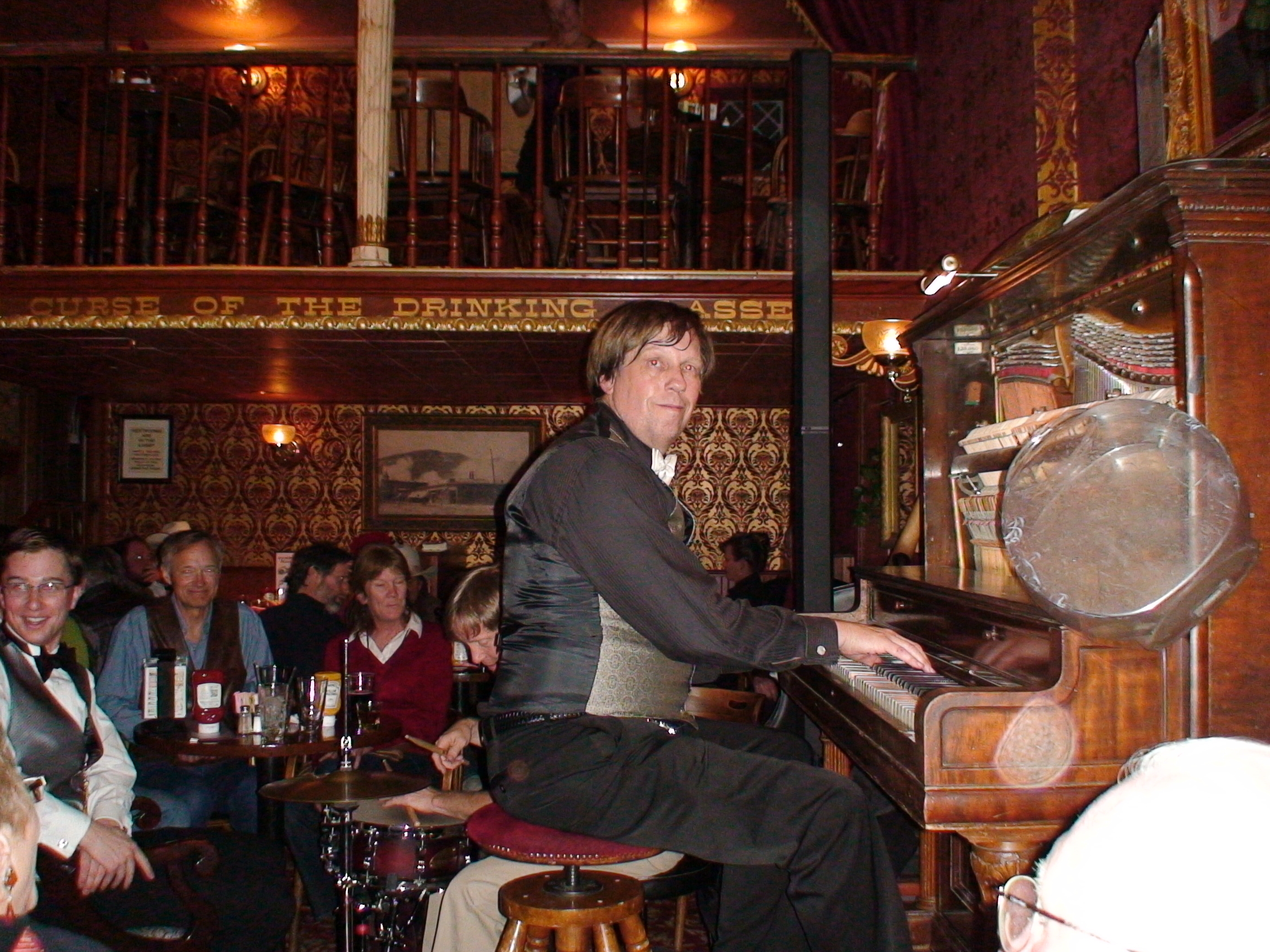 |
He is hard at work on three more tomes directly related to ragtime at this juncture, and produces one or two new seminars on aspects of the topic each year to present at various festivals. Some of the fruit of this labor of love can be found in the
Resources Section of this website, echoed in many Wikipedia articles and quoted on other websites around the world. His passion is also to keep ragtime relevant as an American music form, and continue to bring the lives of its early performers and composers into focus in such a way that it engages younger audiences and creates a new demand for performers.
In 2016, Bill was deeply honored by the Scott Joplin International Ragtime Foundation when they gave him the highest possible recognition in the field of ragtime at the June, 2016 Scott Joplin Ragtime Festival. He was the 2016 recipient of their award "For Oustanding Achievement in Research, Performance and Advancement of Ragtime."
Honky Tonk Piano (2023)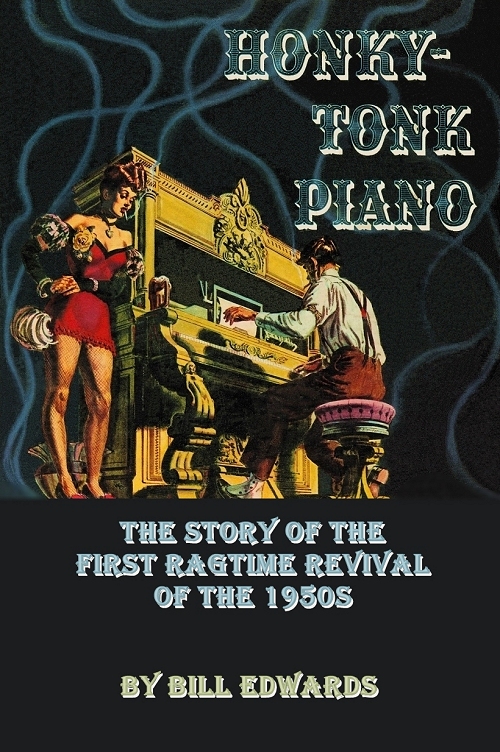 |
That this honor was presented to him no less than his long time friend, veteran ragtime performer, and promoter the late
Max Morath added several levels of special meaning to the event, which was already an emotional evening for the artist. By no means does this humbling honor imply that Bill has achieved all he intends to in this field, and in just five months since that time he managed to finish off another book, write another 12 web biographies, record another CD - this one of stride piano, and took on a project that ended up with the digital restoration of all of the covers (91 that were located) of Scott Joplin's music in time for the centennial of his death (
The Visual Joplin is nearly complete and scheduled for a 2024 release). One other tome released in 2023 goes back to Bill's first musical memories and an important nexus in the continuation of ragtime's popularity into the 2000s.
Honky Tonk Piano is a first of its kind book on that genre of the 1950s, covering groud from the early 1920s into the mid-1960s, focusing on its huge popularity throughout the 1950s. In 2018 he had the good fortune to return to his starting point at the Diamond Belle Saloon in Durango, and is currently engaged there for part of each summer, his career metaphorically coming full circle in that way. After some necessary time in quarantine, and now with COVID more or less behind us, there is still a great deal left to accomplish, but there is no lack of energy or drive on Bill's part, so keep looking for more in the post-pandemic future. More writing. More music. More RAGTIME!
Bill Edwards is usually available with a little advance warning for Ragtime, Old-Time, Blues, Traditional Jazz and Stride Piano performances, in addition to current popular music (yes, even Billie Eilish), contemporary jazz, jazz standards, Broadway (even a little
Hamiilton, and a variety of classical works as well. He also gives informative workshops and seminars on a variety of musical or cultural topics around the United States, and is always interested in tours to other countries to share in their culture. His engaging shows and presentations both entertain and enlighten, and can easily be tailored to special events, local history, or specific themes. Educational programs are also available making music history both fun and relevant for younger students. He also has a large library of silent films of varying genres and lengths, most in high-definition, for a full evening of cinematic enjoyment with live accompaniment. More detailed information can be found on the
Booking Bill page, or you can contact him directly with questions or requests at

. He is available as a pianist for non-ragtime events, including weddings, corporate functions, fundraisers, and more, performing classical, jazz and popular music. For more information on this aspect, please visit
TheIvoryTickler.com. Tell 'em Bill sent you!







 Loading Page. Please Wait...
Loading Page. Please Wait... 


 in Southern California at a time when there were 49 states in the USA (he owns a flag with a 7x7 star field), Richard Nixon was starting preparations for his designs on a White House bid,
in Southern California at a time when there were 49 states in the USA (he owns a flag with a 7x7 star field), Richard Nixon was starting preparations for his designs on a White House bid,










 and has represented that documentary in appearances around the United States. In 2014 Bill had the privilege of filling the role of Artist in Residence for the Scott Joplin Ragtime Festival, taking his message to the children of Sedalia and Pettis County, Missouri, and working to instill them with a sense of their important musical heritage. The future clearly holds more ragtime for the "Perfessor" and fans of this truly America music!
and has represented that documentary in appearances around the United States. In 2014 Bill had the privilege of filling the role of Artist in Residence for the Scott Joplin Ragtime Festival, taking his message to the children of Sedalia and Pettis County, Missouri, and working to instill them with a sense of their important musical heritage. The future clearly holds more ragtime for the "Perfessor" and fans of this truly America music!

 . He is available as a pianist for non-ragtime events, including weddings, corporate functions, fundraisers, and more, performing classical, jazz and popular music. For more information on this aspect, please visit TheIvoryTickler.com. Tell 'em Bill sent you!
. He is available as a pianist for non-ragtime events, including weddings, corporate functions, fundraisers, and more, performing classical, jazz and popular music. For more information on this aspect, please visit TheIvoryTickler.com. Tell 'em Bill sent you!

